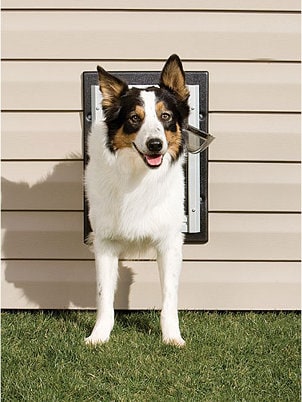Make your dog feel welcome in your home with the best
dog supplies for his needs, whether he's a puppy or an aged pet. Our dogs are more than just animals, more than just pets; they're our loyal friends and companions. Studies have shown that having pets can reduce stress, relieve depression, lower blood pressure and even reduce health-care costs! Dogs return our love with loyalty, protection and a furry shoulder to cry on. Use this
dog supplies buying guide to direct you as you discover how to buy the pet supplies that your dog will use and love.
Buying Dog Supplies:

- Kennels and carriers: Dog kennels and carriers are very important dog supplies. They can serve many different purposes for dogs: The den-like feel is comforting for puppies and kennel-trained dogs, and when you're away, you'll be at ease knowing Fido isn't up to mischief.
- Dog beds: The dog bed you choose should provide support, security and comfort to your dog, so choose one that is right for your dog's sleeping habits and for his breed. Round dog beds are great for small to medium breeds, while large cushion-style beds make better dog supplies for large dogs or dogs who like to stretch out. You may even want to consider a heated or memory foam bed to pamper your pooch or take care of an aging pet.
- Dog clothing: Dog clothing can range from fancy outfits to warm sweaters to adorable costumes. If you walk your dog on cold mornings, a doggie sweater or coat will make the walk more enjoyable. Remember that not all dogs will want to wear dog clothing. If she fights it, just forget it.
- Dog collars: When considering size, remember that a narrow dog collar will cut into a big dog's neck and a wide dog collar will be unwieldy for a small dog. When the pet collar is around your dog's neck, you should be able to fit two fingers between the dog collar and her neck. Leather pet collars are comfortable, but you'll want to use a walking collar or nylon collar to go on walks. Dog training collars are useful dog supplies during training only; dogs should never be left alone with training collars on.
- Dog leashes: Pet leashes are important for the safety of your dog; they are to lead and restrain your dog when he wants to wander or dash off. Dog leashes come in a few sizes, the most common being 3-foot and 6-foot. If you aren't as strict about your dog remaining on heel, opt for a retractable dog leash; Fido can still wander while under your control.
- Dog toys: Busy dogs need toys, and the bigger the dog is, the tougher the dog toy needs to be. Solo pet toys are great for entertaining your dog while you're away, while interactive pet toys, like retrieving toys or tug-of-war ropes, help build a bond between dog and owner. Remember to replace dog supplies when they have been chewed up -- before they start falling apart -- to avoid choking hazards.
- Bones and treats: Use bones and dog treats for training, cleaning teeth and supplementing your dog's diet. Pet treats are formulated specially for your dog's body. Choose bones and treats based on your dog's size: Large dogs can choke on small pet treats, and little dogs don't need a whole large treat.
- Dog food: Basic nutrition is important for the health of your dog. There are several types of dog food available. Remember that puppies and older dogs have special dog food formulated especially for them. Dog food should be fresh. If you keep your dog food outdoors, make sure that it is protected from rodents and bugs.
- Dishes: Sturdy dog dishes for both food and water are necessary pet supplies. Vets recommend ceramic or stainless steel dishes over plastic ones because plastic can get scratched and harbor bacteria. A raised feeder is especially healthy for dogs because standing while eating makes digestion easier. Raised feeders are a must for older dogs that have joint pain.
Buy Pet Supplies
This article was written by Andrea Sparks from Overstock.com

No comments:
Post a Comment